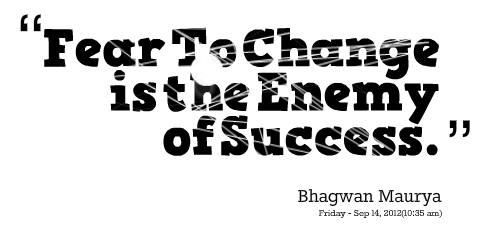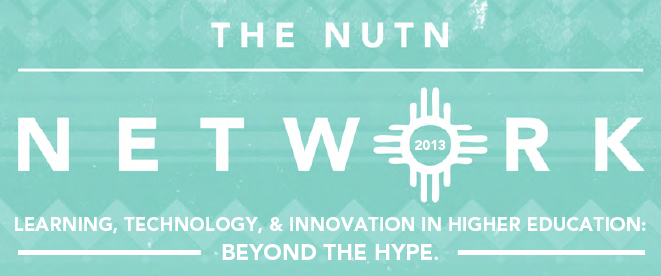We talk about change in higher education. That is mostly all we do is talk. Sure we use cool words like disruption and collaboration but we mostly just talk. Why is anyone really surprised, isn’t that what is happening in the classroom…lots of talk and almost no practical application?
I read an article by John R. Childress entitled Culture Change and Leadership. John makes some great points, particularly relating to getting the undecided or caution to change. I have witnessed first hand innovative programs, processes and policies at a multitude of educational institutions come to a standstill because of fear. That is really what keeps the undecided and cautions from substantial change.
People talk about “fear of change” but it is really not a fear of change, it is a fear of their ability to adapt and overcome. What happens if the change is not the right choice? How will I handle criticism? What will people think; my staff, my board, my boss? And maybe the greatest fear of all, what happens if I lose my job.
I find it interesting in my years as a pain in the butt, now affectionately called a change agent, you can spot the truly innovative leaders. They are often perceived as cocky by the undecided and cautions because their confidence is in sharp contrast to the confidence of the fearful. Find the person in your organization that says, “Hey, I was looking for a job when I came here.” Most often, that is the person who is not fear struck and given the opportunity to truly facilitate change. The attitude is powered by their self-confidence and an ongoing battle with the fearful.
 Everyday I see academic leaders, faculty and staff controlled by their fear. If you want some truly good entertainment, put a couple of leaders who are fearful in the room with a couple of cocky S.O.B.’s and ask them to make some tough decisions. The cocky use phrases like: what’s the worst that can happen? let’s try this and see how it goes; seriously, how long are we going to talk about this before we actually do something. And the fearful responses…well, we need to make sure this is the right move; can you get me some more information; why do we need to move so fast; I think I need to check with my people.
Everyday I see academic leaders, faculty and staff controlled by their fear. If you want some truly good entertainment, put a couple of leaders who are fearful in the room with a couple of cocky S.O.B.’s and ask them to make some tough decisions. The cocky use phrases like: what’s the worst that can happen? let’s try this and see how it goes; seriously, how long are we going to talk about this before we actually do something. And the fearful responses…well, we need to make sure this is the right move; can you get me some more information; why do we need to move so fast; I think I need to check with my people.
Let me know your thoughts, examples you have witnessed….unless you are too fearful…what’s the worst that can happen?



 What could possibly go wrong with Congress involved? Oh wait, didn’t this entire state authorization debacle get started because one Senator wanted to stop the spread of for-profit education. Hey, thanks for the help!
What could possibly go wrong with Congress involved? Oh wait, didn’t this entire state authorization debacle get started because one Senator wanted to stop the spread of for-profit education. Hey, thanks for the help!
